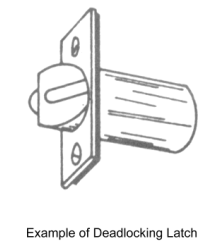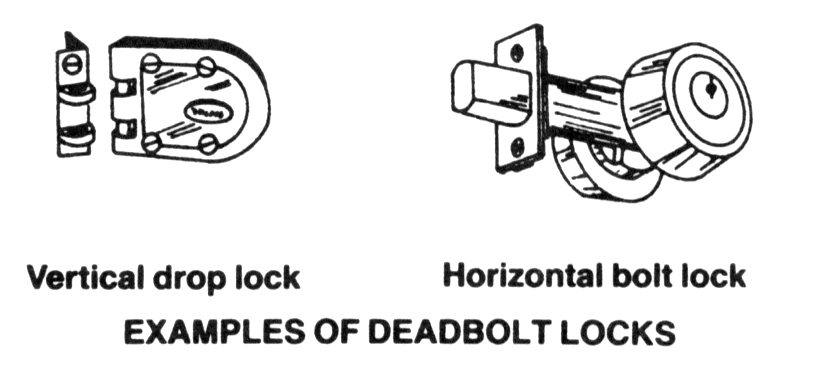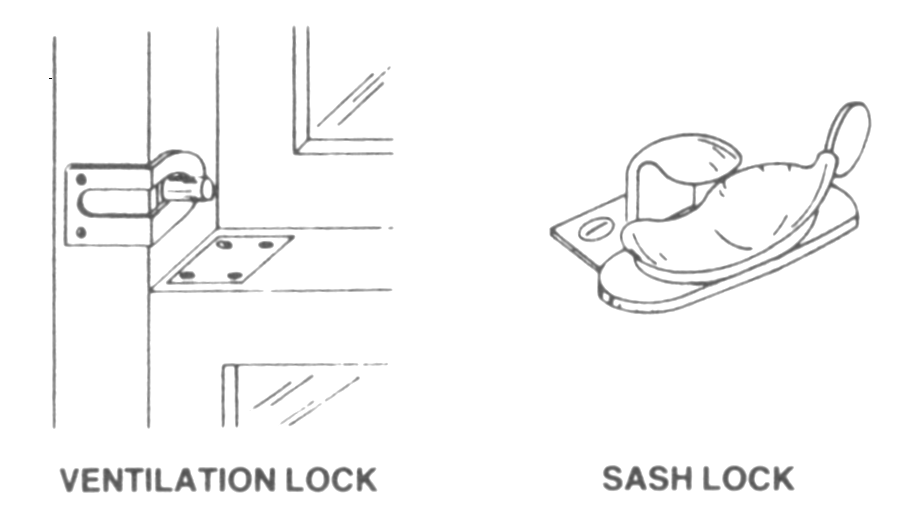This letter applies to residents within the city of Chicago only who are covered under the Residential Landlord Tenant Ordinance (RLTO). Please see the Exceptions to the RLTO to ensure the law applies to you.
For tenants in suburban Chicagoland, please click here for the law as it applies in your town.
Category: Building Security & Locks
Building Security, Locks, & the Law – FAQ
NOTE: If your landlord lives in your building, see the “Exceptions” note on the right side of this page.
 Is there a law requiring my landlord to change the locks before I move in? Yes. An amendment to state law 765 ILCS 705 § 15, also known as the Landlord Tenant Act, requires lessors to change or re-key locks on or before the day that a new tenant moves in.
Is there a law requiring my landlord to change the locks before I move in? Yes. An amendment to state law 765 ILCS 705 § 15, also known as the Landlord Tenant Act, requires lessors to change or re-key locks on or before the day that a new tenant moves in.
What kinds of locks must be on the front and rear doors of my building?
The front and rear entrance doors to the building should each have a DEADLOCKING LATCH (see picture), which automatically locks when you shut the door. From the outside, it can be opened only with a key. From the inside, it can be opened merely by turning a knob or handle.
If my building has a vestibule or lobby, with an outside door and an inside door, must they both have a deadlocking latch?
No. Only one of these doors must have this latch.
 What kind of lock must be on the doors to my own apartment?
What kind of lock must be on the doors to my own apartment?
Both the front and rear doors to the apartment must have a DEADBOLT LOCK. This can be a “vertical drop” type lock (see picture), or a saw-resistant horizontal bolt that projects at least one inch. If you are not sure what kind of locks you have, ask a locksmith.
Must the front door of my apartment have a window or peephole?
Yes. It must have some kind of viewing device that allows you to look out the door without opening it.
 Should my windows have locks?
Should my windows have locks?
If your window is less than 20 feet from the ground (or within 10 feet of an adjacent roof, outside stairway, fire escape, ramp, or porch which can be reached from the ground), then it must have a SASH LOCK It must also have a lock which allows it to open 4 to 6 inches and then lock in that position. This is called a VENTILATION LOCK.
Who is responsible for the cost of installing these locks?
Your landlord. If you want more security than these locks provide, you must get your landlord’s permission to install them and you must give him/her a set of keys. Your landlord does not have to pay for the additional locks.
What about burglar bars?
You cannot install burglar bars without your landlord’s permission. (Make sure you get this permission in writing). Furthermore, your landlord does not have to pay for the burglar bars or their installation. Because bars become a permanent part of his/her building, they also become her property. NOTE: It is against the law to install burglar bars on the entrance or exit doors to your apartment or building. Furthermore, certain burglar bars are illegal, so contact the fire or police department to find out whether the kind you want to buy are legal.
What if my doors and windows do not have the required locks?
Send your landlord a written demand for the right locks, and keep a copy of this letter. If your landlord does not comply with your demand you can call the Department of Buildings (312/744-5000), which can sue your landlord and force him/her to install the required locks.
If my landlord refuses to install the correct locks, can I install them myself and deduct the cost of installation from my rent?
Only if your tenancy is governed by Chicago’s Residential Landlord and Tenant Ordinance. If you live in Chicago, the Ordinance governs your tenancy unless you reside in:
- An owner occupied building containing less than seven apartments;
- A hotel, motel, inn, rooming house, or boarding house (unless you have resided there for more than 31 days and pay rent on a monthly basis); or
- A hospital, convent, monastery, school dormitory,temporary overnight or transitional shelter, cooperative, or
- A building owned by your employer (assuming your right to live there is conditioned upon you being employed in or around the building).
How do I install the correct locks and deduct the cost of installation from my rent?
You must first give your landlord a written notice stating that, if he/she does not install the required locks in 14 days, you will install them yourself and deduct the cost of installation from your rent. Keep a copy of this notice. If your landlord does not install the locks within 14 days, you may install them yourself or pay a locksmith to install them. After providing your landlord with paid receipts confirming the cost of installation, you can deduct this cost from your rent. This procedure is called repair and deduct. Remember, you can use this procedure only if your tenancy is governed by the Ordinance.
If I use the “repair and deduct” procedure, how much can I spend?
Up to $500 or one-half your monthly rent, whichever is greater.
Can I use the “repair and deduct” procedure to install the correct locks on the entrance door to my building?
Yes, but you must first give all the other tenants in the building written notice that you are going to do this.
If I install new locks on my door, must I provide my landlord with a key?
Yes, because your landlord must be able to get into your apartment.
When must I let my landlord into my apartment?
You must let your landlord enter your apartment to:
- Make necessary repairs;
- Supply necessary services;
- Show the apartment to prospective purchasers, workmen, etc.;
- Show the apartment to prospective renters within 60 days of the date on which your lease expires; or
- Determine whether you are complying with the terms of your lease agreement.
Your landlord must provide you with at least two days notice, and he/she can only enter your unit at a reasonable time. Entry between the hours of 8:00 a.m. and 8:00 p.m. is presumed to be reasonable.
Does my landlord ever have the right to enter my apartment without giving me advance notice?
Yes, but only when:
- There is a problem in the common area of the building or in another apartment, and he/she needs to enter your unit to unit to fix this problem; or
- There is an emergency.
In either case, your landlord must let you know that he/she entered your apartment within two days after the entry.
What if my landlord keeps coming into my apartment to harass me?
You can call the police. If your landlord does not have a right to be in your apartment, the police should force him/her to leave. You can also:
- File a lawsuit and ask the court to order your landlord to stop entering your apartment more often than necessary; or
- Give your landlord written notice that you will terminate your lease agreement unless he/she stops harassing you within the next 14 days. If he/she does not stop, you can terminate the lease. If you terminate the lease, however, you must move within the next 30 days. Otherwise, the lease will remain in effect. You should consult with an attorney before pursuing either of these two options.
Can I refuse to let my landlord into my apartment?
Only if you have a good reason. For instance, you can refuse to let your landlord in if he/she has not provided you with the required advance notice, or if he/she is trying to enter your apartment between 8:00 p.m. and 8:00 a.m. (Remember, however, you cannot refuse to let your landlord in when there is an emergency). If you are not sure whether you have a good reason to deny your landlord access to your apartment, call an attorney or the Metropolitan Tenants Organization (773/292-4988).
What if, without good reason, I refuse to let my landlord into my apartment?
Your landlord can:
- File a lawsuit and ask the court to order you to let him/her into the apartment; or
- Terminate your lease agreement and have you evicted. (See the pamphlet entitled Evictions for more information).
Please Note:This pamphlet, published by the Legal Assistance Foundation of Chicago and the Metropolitan Tenants Organization as a public service, gives you only a general idea of your rights and responsibilities under the Residential Landlord and Tenant Ordinance and other relevant chapters of Chicagoís Municipal Code. It is meant to inform, but not to advise. Before enforcing your rights, you may want to seek the advice of an attorney who can analyze the facts of your case and apply the law to these facts.
Still can’t find the answer? Send us your questions. Please allow several days for a response.